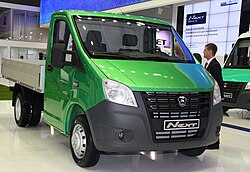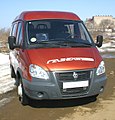GAZelle
This article needs additional citations for verification. (February 2017) |
| GAZelle | |
|---|---|
 GAZelle with the restyled front end introduced in 2003 | |
| Overview | |
| Manufacturer | GAZ (Gorky Automobile Plant) |
| Production | 1994–present |
| Assembly |
|
| Body and chassis | |
| Class | Light commercial vehicle (M) |
| Body style | 2-door dropside truck 2/4-door pickup truck 4-door panel van 4-door minibus |
| Layout | FR layout |
| Related | GAZ-31029 |
| Powertrain | |
| Engine | |
| Transmission | 5-speed manual |
| Chronology | |
| Predecessor | RAF-2203 |
| Successor | Gazelle NEXT |
The GAZelle (Russian: ГАЗе́ль) is a series of light commercial vehicle—pickup trucks, vans and minibuses—made by Russian car manufacturer GAZ. At the time of the dissolution of the Soviet Union and transition to a market economy, the Russian automobile industry had not produced a much-demanded LCV similar to the Ford Transit or VW T4 class. The GAZelle shares many parts with the company's passenger cars (especially GAZ-31029); in fact, models produced until 1998 had the same grille. Riga Autobus Factory, which formerly manufactured minibuses for the whole USSR, remained in Latvia, and now required its vehicles be sold to the now-foreign Russian market for hard currency. Responding to this market opportunity, GAZ swiftly developed its own LCV called GAZelle (the name is a pun on "gazelle"), which, taken together with its lighter version, Sobol, now account for the majority of the Russian van and light truck market[1] and have strong positions in the markets of other CIS countries, ranking as GAZ's most popular and successful products.[2]
The GAZelle's design is superficially reminiscent of the 1986 Ford Transit,[3][4] but the two cars have nothing in common.[5][6][7] It has remained very successful on the Russian market despite minimal upgrades.
Design
[edit]The development dates back to both Soviet designs of the 1980s, which were originally intended for production in a never commissioned vehicle plant in Kirovabad (Azerbaijan), as well as unofficial developments of the GAZ plant from the same period.[6] The project could only be pursued further by GAZ after the collapse of the Soviet Union. In August 1993 the GAZelle was presented at a motor show in Moscow, production started in July[6] or at the end of 1994[7] in Nizhny Novgorod.[6] The GAZelle uses only Russian-made engines, different manual transmissions were installed, there was no option for an automatic transmission. Also, the front seats have been changed in design, as well as the heating and ventilation system and the engine radiator, the dashboard was redesigned. The ground clearance of the Russian vehicles is higher, it was adapted to the road conditions in Russia.[5]
In 1999 GAZ started production of all-terrain 4x4 versions of GAZelle that utilized parts of the heavier-class vehicles. Now it features an optional rear differential lock offered at ~US$500 extra.
By 2005 one million GAZelles had been built. Apart from the CIS countries and Central and Eastern Europe, GAZelles are exported to Asian and African markets, including Morocco[8] and the Philippines.[9][10]
In 2010–2011 the GAZelle family underwent a serious upgrade. The upgraded model was renamed GAZelle Business. The changes affected 20 main vehicle units and systems, including steering, brakes, gearbox, cooling system, transmission and interior.[11]
In 2013 GAZ started serial production of the new generation GAZelle NEXT light commercial vehicle that features freighter, van, minibus and other versions of different sizes.[12][13]
Generations
[edit]| Name | Date | Photo |
|---|---|---|
| GAZelle | 1994 – Start of production of the first generation. Initially released only freighters.
1996 – Started production of minibuses 1998 – Started production of scaled-down version called Sobol[citation needed] |
 | |
|
| GAZelle | 2003 – Started production of the second generation. Changes: new teardrop-shaped headlights instead of rectangular, new grille, new front bumper, increased space under the hood, rear colorless lenses turning lights, combined with the reversing light lenses. A new dashboard and power steering, steel versions are available with all-wheel drive.
2004 – ABS introduced 2006 – side repeaters turning lights moved from the front wings to the side mirrors, which were painted body color |
 | |
|
| GAZelle-Business | 2010 – Scale modernization, construction of 130 changes including a new grill combined with the bumper. Inside, the new family of vehicles differs from their predecessors by way of a front panel, steering wheel, standard audio head unit from Blaupunkt, new cab heater control unit or the front of the cabin.
Engine UMZ – 4216 (fresh family car commercial - UMZ - 4216.10 ) got a new injection control program, whereby the maximum torque (220.5 Nm) is achieved at fairly low (for a gasoline engine) 2500 rpm. The family of " GAZelle Business " engine mountings were introduced Anvis Group, radiator with aluminum core TRM, Bosch electrical components and Brisk spark plugs. The drive brakes used Bosch products (in particular, the brake master cylinder and the brake servo), the drive clutch components and ZF Sachs, power steering from ZF Lenksysteme was introduced along with defroster door mirrors as standard. New modification of the car with 2010 was equipped with a turbocharged diesel engine (Cummins ISF American development). 2011 – In the factory catalog, the first appearance of a shuttle van with a high roof. 2013 – Started producing modifications with bi-fuel petrol-gas engine. |
 | |
|
| GAZelle Next | 2013 – started production of a completely new LCV, while the production of the 2010 version continues. |  | |
|
Models
[edit]- GAZ-3302 dropside truck and chassis, rear-wheel drive, regular three-seat cab
- GAZ-33021 dropside truck and chassis, improved, RWD
- GAZ-33023 dropside truck and chassis, all-wheel drive
- GAZ-33027 dropside truck and chassis, six-seat "King Cab" extended cab, RWD
- GAZ-330237 dropside truck and chassis, extended cab, AWD
- GAZ-3221 minibus, 8 seats, RWD
- GAZ-32213 minibus, 13 seats, RWD
- GAZ-322132 minibus, 13 seats (marshrutka, for shuttle services), RWD
- GAZ-2705 panel van, RWD
- GAZ-27051 ambulance, RWD
- GAZ-27052 Combi panel van, extended cab, RWD
- GAZ-27057 Combi panel van, extended cab, AWD
Variants
[edit]The GAZ Sobol is a lighter duty version of the GAZelle, built on a shorter wheelbase. It was introduced in 1998.
The GAZ Valdai is a heavier duty version of the GAZelle, built on a longer wheelbase. It was introduced in 2003 and discontinued in favor of the GAZon.
The GAZelle cabin is also used for building tracked all-terrain carriers such as GAZ-3409 «Bobr» (Beaver).[14]
Before GAZ introduced its own GAZelle-based minibus, various smaller Russian factories launched rebuilding of freight GAZelles into minibuses ("Pskova-2214", "STG-01") and different custom vehicles.[15] A few Russian and Ukrainian factories still produce custom buses and ambulances based on GAZelles of "Business" and "NEXT" generations.
Trim levels
[edit]Before the 2010 upgrade, customers were not given the opportunity to select options. Currently the Gazelle-Business can be ordered with a rear differential lock, ABS braking system, "de luxe" instrument panel, and the "Package" option that includes fog lights, electroproof mirrors, front electric windows, dashboard "de luxe" (radio control buttons on the steering wheel and audio package) and central locking of the front doors.
The succeeding GAZelle NEXT generation of LCVs has its own schedule of basic trim levels and options.
Gallery
[edit]-
GAZelle Next ambulance
-
GAZelle 2705 school bus
-
A white GAZ-322133 GAZelle taxi minibus
-
GAZelle ambulance in Kharkiv
-
GAZelle ambulance in Tomsk
-
GAZelle in Prague
-
The shorter GAZ Sobol as a police van
-
GAZelle-Business (2010–present)
-
A firefighting GAZelle van in Saratov
-
GAZ-27527 Sobol all-terrain camper
-
Sobol'-based camper van
-
Pickup utility truck
See also
[edit]References
[edit]- ^ "Поехали на рынок: продажи коммерческого транспорта в России растут | Бизнес". Forbes.ru. 2018-02-15. Retrieved 2019-04-24.
- ^ "Russia launches production of GAZelle Next commercial vehicle in Turkey". TASS (in Russian). Retrieved 2019-04-24.
- ^ Gibbs, Nick (15 October 2012). "Russia revival: Contract assembly, cargo vans fuel GAZ rebirth". Automotive News Europe. Archived from the original on 2021-02-03.
- ^ Klimov, Alexander (2019-07-22). "GAZelle celebrated 25th anniversary!". Tretiy Rim. Archived from the original on 2023-08-25.
- ^ a b S. Iunes: Иномарка, «похожая» на «Газель». Сравнение «Форд-Транзит» и «Газель». In: Грузовик Пресс, 06/2005 (russian)
- ^ a b c d Andy Thompson: Trucks of the Soviet Union. Behemoth, 2017, ISBN 978-0-9928769-5-1, p. 308.
- ^ a b L. M. Shugurov: Avtomobili Rossii. ILBI, Moscow 1998, p. 167.
- ^ "Russian GAZ Launches Sales of its Commercial Vehicles in Morocco". The North Africa Post. 2018-07-06. Retrieved 2019-04-24.
- ^ "ГАЗ начал продажи коммерческой техники в Марокко". azgaz.ru (in Russian). Retrieved 2019-04-24.
- ^ "Продажи микроавтобусов "ГАЗель NEXT" стартовали на Филиппинах". azgaz.ru (in Russian). Retrieved 2019-04-24.
- ^ "GAZ Group has started serial production of upgraded GAZelle-Business" (Press release). GAZ Group. 2010-02-25. Archived from the original on 2011-09-25.
- ^ "Gorky Automobile plant to showcase its products at the International Motor Show in the Philippines". Automotive World. 4 April 2019. Archived from the original on 2019-04-09.
- ^ "ГАЗ представил в Европе новые модели для экспортных рынков". azgaz.ru (in Russian). Retrieved 2019-04-24.
- ^ "ГАЗ 3409 Бобр | Купить вездеход ГАЗ-3409 Бобр Цена: по запросу". www.gaz-34039.ru. Retrieved 2019-04-24.
- ^ "Микроавтобусы и микрогрузовики завода "Терминал"". www.gruzovikpress.ru. Retrieved 2019-04-24.
External links
[edit]- GaZ's official GAZelle Page Archived 2016-03-19 at the Wayback Machine (English)
- Official site of plant in Turkey Archived 2017-06-15 at the Wayback Machine
- Club car owners Gazelle (Russian)












